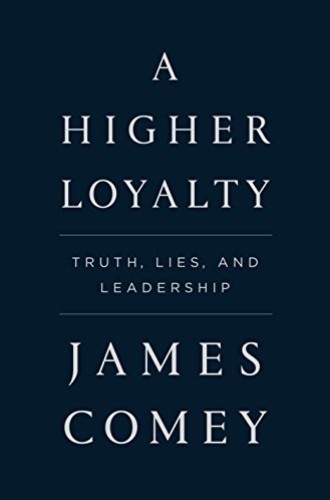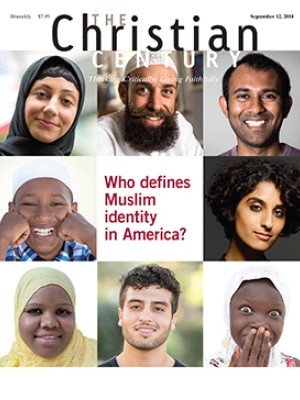James Comey didn’t write a tell-all. He wrote a handbook.
What does ethical leadership look like?
After his high-profile dismissal as director of the FBI, James Comey might predictably have written a memoir of his life that vindicates his career in public service. Readers get some of that, with stories of the women and men who mentored him as a lawyer and an inside look at what it was like to prosecute leading members of Mafia crime families.
We might also look for exciting new information about what goes on at the highest levels of government and about the FBI investigations of Clinton’s emails and Russian electoral manipulation that brought Comey into the spotlight in 2016. But there is almost none of that. We learn a bit about how it feels to sit in the Oval Office with several very different presidents, but Comey insists on principle that what was classified remains classified, and he is candid about the fact that he knows nothing about how these investigations have developed since he was abruptly fired on May 9, 2017. Apart from a few personal details, there is nothing here that we could not have read in the newspapers.
Read our latest issue or browse back issues.
A Higher Loyalty is instead a handbook on ethical leadership. The stories about his mentors, superiors, and subordinates each contain a pointed lesson about how to maintain an organization that is transparent, truthful, and focused on its central mission. Former FBI director Robert Mueller and attorney general John Ashcroft contribute to those insights, as do presidents George W. Bush and Barack Obama, each in very different ways. Special attention goes, too, to his wife, Patrice, who keeps him focused on the main thing precisely by reminding him that he is not the main thing.
For Comey, the higher loyalty is to the rule of law and to the justice system within which he spent his career as a prosecutor and FBI director. The rule of law requires enforcement that is transparent, objective, and operates at a distance from the political forces in Congress and presidential administrations, even while it remains accountable to these elected leaders. Without this commitment to justice above politics, people lose confidence in the legal system and eventually the rule of law itself is eroded. This perspective contrasts sharply to what Comey calls “tribalism,” the emphasis on loyalty and the pursuit of self-interest at the expense of outsiders that characterizes Mafia “families” and, for Comey, much of contemporary politics.
There is some tension in this account between two tasks: explaining the permanent problems within our justice system and meeting the urgent need to warn about real dangers in the present situation. Those who are charged with ethical leadership in the administration of justice will always have to be alert to political pressures, and they will always have to make hard decisions about how to balance urgent goals against legal principles. Robert Kennedy’s approval of J. Edgar Hoover’s surveillance of civil rights leaders and the so-called torture memos that provided legal cover for the abuse of prisoners after September 11 are for Comey pointed lessons that ethical leadership is always at risk from intimidation, concealment, or failure to see what is at stake in decisions that seem urgent or obvious in the moment.
But it is also true that the narrative in A Higher Loyalty is nicely calibrated to show President Trump violating every one of the principles of ethical leadership in the private meetings and public statements around Comey’s dismissal. In the end, his higher loyalty to the system of justice precluded the pledge of personal loyalty that the president demanded, and Comey stood by the lessons he had learned from the people he tells us about in the earlier chapters.
There are limits to the idea of a higher loyalty, of course. Comey hints at these in his allusions to the moral ambiguity Reinhold Niebuhr saw in every human community and in his reminder that Martin Luther King Jr. wrote his most eloquent appeal for justice while locked up in a city jail. A justice system can impartially enforce discrimination as well as equal rights. Moreover, for the oppressed, tribalism is sometimes a necessary accompaniment to the search for justice, creating the solidarity without which a movement is too easily divided and scattered. If A Higher Loyalty were offered to us as a theory of justice, we ethics professors would have to criticize it for not making these limitations more explicit.
But Comey’s book is not a philosophical treatise. It is, in general, a guide to ethical leadership and, more particularly, a handbook of professional ethics for the justice system. With appropriate adjustments for different professional contexts, clergy, physicians, journalists, and teachers could all learn from it.
In every system of professional ethics, there is a very small number of principles that identify core problems and set the terms for the difficult decisions people in that profession have to make. In medicine, there is the ancient rule of “Do no harm.” For clergy, I think, these principles have to include an absolute respect for the boundaries that are always at risk in the intimate personal relationships involved in pastoral care and pastoral leadership.
For many reasons that A Higher Loyalty makes clear, in the administration of justice the principles are about maintaining a distance between the political objectives of the moment and the enduring rule of law. Somewhere in our synods, seminary classrooms, and church basements, it is part of religious leadership to ask a higher question about this higher loyalty—whether the system of justice as we have it is actually just. But when the director of the FBI sits down in the Oval Office, we had better hope that loyalty to whatever measure of truthfulness, objectivity, and justice we have so far achieved takes precedence over the tribal loyalties that are always ready to assert themselves in its place.
A version of this article appears in the print edition under the title “Leaders and loyalties.”






